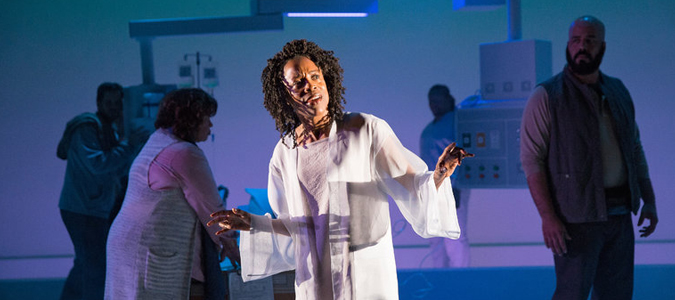

War
Opening Night: June 6, 2016
Closing: July 3, 2016
Theater: Lincoln Center Theater
Tensions escalate between Tate and Joanne after their mother has a stroke. As they attack each other in their mother’s hospital room, they are ambushed by two strangers who make a shocking claim about their grandfather during WWII. With bold theatricality and disarming humor, WAR follows a fractured family as its members navigate the landmines of the past and try to broker peace with each other – and themselves – in the present.
BUY TICKETSREAD THE REVIEWS:
June 6, 2016
Identity. Look hard — and then harder — at that word until it wavers, fragments and dissolves before your eyes, and you begin to wonder if it amounts to anything other than an assemblage of diversely shaped letters that might as well be runes. It’s enough to give you a headache, isn’t it? Well, that’s sort of the experience of watching Branden Jacobs-Jenkins’s “War,” a portrait of family as a state of civil conflict that opened on Monday night at the Claire Tow Theater at Lincoln Center. This is a heavily confused play about cultural confusion, a consideration of identity — racial, social, political, anthropological, even biological — that never settles into a coherent identity of its own. You could call it a casualty of the very existential maladies it investigates. And it seems fitting that it should befall a work by Mr. Jacobs-Jenkins, who is both one of the most exciting young dramatists working today and one of the hardest to categorize. His specialty is the ambiguity of self, particularly as defined by skin color, and the futility as well as the necessity of looking for solid answers. To explore this knotty subject, Mr. Jacobs-Jenkins has taken such radically different approaches that it would be hard to immediately determine the authorship of his individual plays if his name weren’t on them. His works have included a satisfyingly cynical thriller, about murder in the workplace (“Gloria,” a Pulitzer Prize finalist this year), and a genre-bending detonation of a 19th-century melodrama about interracial love (the brilliant “An Octoroon”). Then there’s “Neighbors,” a self-described “epic with cartoons” about a blackface-wearing black family, and “Appropriate,” about a white family with an oppressive past, which seemed to borrow from just about every classic American drama of domestic dysfunction. The one thing these works have in common is a cool and canny authorial distance, a sense of an observer with a merciless eye for human inconsistencies. In “War,” directed by Lileana Blain-Cruz (who also staged an earlier version at the Yale Repertory Theater in 2014), it feels as if this writer has for once entered the fray directly, and lost his footing. The story of a divided clan uneasily united around the hospital deathbed of its matriarch, it may well be Mr. Jacobs-Jenkins’s most far-reaching statement about how the hunt for identity strands and estranges people, even from those they should be closest to. But it is so replete with ideas and arguments — and tries to cover so much territory within a confined space — that it chokes on its ambitions. Not that many of the ideas, and the various ways in which they’re presented, aren’t provocative in themselves. There is, for example, the matter of the apes, or alphas, as they prefer to call themselves. They inhabit the limbo-land wherein Roberta (the luminous Charlayne Woodard in gracious hostess mode) finds herself after having a stroke. Her body may be in a Washington hospital, but her spirit inhabits this planet of the apes. And it is here that she must rediscover who and what she was, from the very beginning. At the same time, in the real world by that hospital bed, Roberta’s contentious children — Tate (Chris Myers), a prickly gay political consultant, and Joanne (Rachel Nicks), a stay-at-home mom married to the white Malcolm (Reggie Gowland) — are squabbling over what to do about Mom. Their fight is further stoked by the presence of an addled, non-English-speaking stranger, Elfriede (a touching Michele Shay). Elfriede is accompanied by her grown son, Tobias (a bellicose Austin Durant), who acts as his mother’s interpreter. Thus we learn that Elfriede is a member of the family, the product of a wartime affair between Roberta’s father and a German woman. Now consider the conflicted levels of time and place that Mr. Jacobs-Jenkins has thrown into play here. We have the ancestral oblivion of ape limbo, in which Roberta is lost; the despoiled Germany of the 1940s, in which her father was an exotic alien (the Germans made monkey noises when they saw him); and the fractious present, in which even brother and sister cannot connect. “Why is everything some war in this family!?” asks a tearful Joanne, after an especially nasty blowout with the arrogant Tate. “Everything is a part of some struggle that seems like it’s never going to end — that no one even understands!” That is perhaps the bluntest declaration of the central theme here. But “War” doesn’t lack for other blunt declarations and for long and winding passages of exposition that cover the same patches of family history again and again. (The spectral Roberta has to recreate her entire life story with her ape friends, embodied by the rest of the cast and led by Lance Coadie Williams, who doubles as a sassy hospital nurse.) Now you could argue that modern playwrights have always had a penchant for turning family grievances into repeated litanies. Look at Eugene O’Neill’s “Long Day’s Journey Into Night” or Stephen Karam’s “The Humans” (both currently on Broadway) or any of Edward Albee’s domestic dramas. The difference is that here Mr. Jacobs-Jenkins uses such repetition not to convey psychological character but to make sociological points. He is unusual among first-rate playwrights in that his empathy seems largely abstract. He understands his characters, but you don’t feel he connects with them. And it makes connection similarly hard for us and for the talented performers playing them. Designed by a solid team that includes Mimi Lien (sets), Matt Frey (lighting) and Bray Poor (sound), “War” works hard to conjure a physical sense of worlds overlapping into eternity, with sliding floors and projected words to translate for the nonverbal apes. But this production, which has become more congested since I saw it at the Yale Rep, still seems to exist in limbo in ways that its seriously gifted writer never intended.
READ THE REVIEW


















